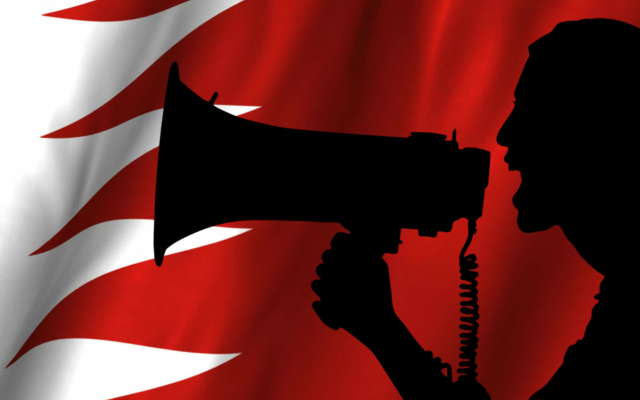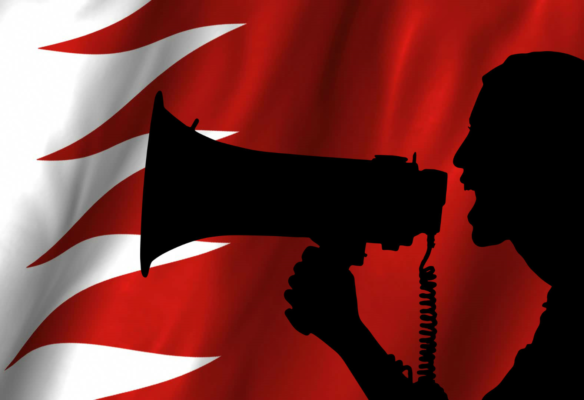Click here to read Part One of our Voices from the Ground installment, #BahrainSpeaks
Since the 2011 Bahraini uprisings, there has been a severe crackdown from the government on the civil liberties of the country’s citizens. Years of mass incarceration, torturing political prisoners, and repressing the freedoms of speech and assembly have finally culminated in some of the largest protests seen since 2011.
The June 2016 arrest and detention of Nabeel Rajab marked the first in a series of government acts of reprisal against human rights defenders. Nabeel’s imprisonment is accompanied by the exile of Twitter activist Zainab al-Khawaja, dissolution of political opposition party al-Wefaq, an increased prison sentence for al-Wefaq’s Secretary General Sheikh Ali Salman, the denaturalization of Shia cleric Sheikh Isa Qassim, and an uptick in travel bans on Bahraini activists. Continued constraints on religious freedom and expanded press restrictions further deny Bahrainis their basic rights.
The international community has watched all these events unfold over the span of just two months. The United States Department has condemned Bahrain’s unprecedented attempts to silence dissent. The United Kingdom has shared these sentiments of concern. Americans for Democracy & Human Rights in Bahrain (ADHRB) and its partner organizations have been reporting on these events, ensuring that these aggressive attempts by the government to silence dissent are publicly known. However, it is important that the people of Bahrain share their own perspectives on what is happening in their country.
This installment of Voices from the Ground is comprised of interviews with Bahrainis currently in the country, in exile, and in diaspora. Although not all of these individuals are directly on the ground, they have a deep-rooted connection to Bahrain’s narrative. These personal stories are vital for keeping the spirit of the revolution alive. We encourage all of our Bahraini readers and Twitter followers to share their own stories with us, at @ADHRB using the hashtag, #BahrainSpeaks.
Have you seen any response from authorities so far?
It usually takes my family 5-7 minutes to travel between our home and Diraz. Now it takes them an hour and a half because of the checkpoints and police cars. They are preventing everyone who is not originally from Diraz from going inside. The restrictions have been ongoing and increasing, and people are concerned that there will be casualties or injuries soon.
-Bahraini student, 18
No, the government refuses the concept of dialogue with 65% of the religious demography of nationals. In Fact authorities refuse to have dialogue with 65% of its nationals
-Ebrahim Demestani, formerly imprisoned medic and human rights & labor activist
Every day they arrest and summon people who are vocal, whether they are active in Diraz or in other parts of the country. There are serious consequences for those who participate. I am certain that the Bahraini government will continue to retaliate against dissent. The retaliation process has been going on since February 2011.
-Husain Abdullah, Executive Director of ADHRB
The government has been quite unresponsive to the sit-in in Diraz because it has not yet escalated to the extent of resistance seen 2011. It’s already away from the financial sector of the country, so there isn’t a whole lot of pressure from the government to react more strongly yet.
-Maryam al-Khawaja, Co-Director of Gulf Center for Human Rights
The Government hasn’t said anything about Diraz, we appreciate this, it is positive to let people practice freedom of assembly. We’d like to see an end to the checkpoints.
-Matar Matar, former Bahraini MP
The only solution the state has had since 2011 is taking people to jail. Right now it looks like they are not going to be much harsher than that. We expect that they will eventually try to resolve the sit-in in Diraz with excessive force, as was deployed in other villages. But right now things are a bit calmer compared to the first two weeks of the protests.
-Mohamed al-Tajer, Bahraini human rights lawyer
What outcomes do you hope to see from this?
I hope the government stops what they are doing. I hope they sit and listen to the people and free all of the political prisoners. I know that the government will never let this happen, but it’s okay to wish. I hope that they will end what they’ve started.
-Student
I hope the US provides dedicated assistance to pro-democracy activists in Bahrain and draw up a contingency plan for basing the Fifth Fleet, which would signal U.S. concern about the instability driven by the Bahraini government’s crackdown on peaceful protests and refusal to compromise with the opposition.
-Ebrahim
The Bahrain government will realize that the people of Bahrain will not accept the dictatorship as part of their lives. They will see that there will not be stability in Bahrain until there are serious steps taken toward accomplishing a true democracy.
-Husain
I’m hoping that the sit-in spreads to areas where there will actually be pressure for the government to react or hear the demands of the protesters. Because as of now, there hasn’t really been any political will to reform. Any reforms have basically been window dressings.
-Maryam
The best outcome is not to have more condemnation; we are looking for an internal resolution. I care more about Bahrain and the government’s behaviors. Bahraini government must realize this policy is going nowhere, reform is the best policy and can serve all Bahrainis and the government itself. This is an internal issue.
-Matar
For me, I hope that the outcome will be a total solution to this crisis. Bahrainis will not stop protesting until the government provides a peaceful means toward a solution. I hope the government sees that they cannot keep using force and they start finding new steps toward changing the situation in Bahrain.
-Mohamed
What would you like the international community to know about what’s going on in Bahrain?
The international community should take a stand to try and stop what’s going on in Bahrain. The United States and the United Kingdom should stick to their principles that they always talk about. They are always talking about human rights and democracy, well, where is the human rights and democracy in your ally? I wish they would stop their hypocrisy towards Bahrain and actually stand by what they say.
-Student
The international community must capitalize on the words of Federica Mogherini that: The measures taken by the government of Bahrain are” not a human rights issue but a geopolitical issue”. Millions of shiites around the world are insulted and humiliated by these steps
-Ebrahim
One day I would like to see a resolution in the HRC that addresses the ongoing systematic human rights violations in Bahrain. I would like an arms ban on Bahrain, so the government will know that its actions has serious consequences. I would also like the two biggest allies of Bahrain, UK and the US, to seriously reassess their policies toward Bahrain and make their ally feel true pressure, via military cooperation and other bilateral operations.
-Husain
There aren’t many excuses left for allies to look the other way, in the sense that international community needs to start taking a position on Bahrain and what the government is doing. The US Secretary of State said it best during a congressional briefing. He said that Bahrain has two road that it can go down, and there isn’t really a third option. One scenario is that Bahrain will be pressured into doing the right thing and reform will actually happen, and that would obviously be a very good outcome. The other option is the road that they are currently on, which will lead to a lot more violence and a stronger crackdown, which would be a very ugly process. Ultimately the issue is that something has to change.
-Maryam
Western governments should not be supporting Bahrain in the crackdown; they should not be giving arms assistance. The US, UK, & EU must work together and have a unified policy that does not support such a crackdown. They must give the advice that reform is the best choice. Bahrain may listen. Raising awareness is essential to influencing government policy.
-Matar
I would like the international community to put more pressure on Bahrain. It is not enough to just show concern. Groups like the UN not only should show deep concern, but also act on that concern. That is Bahrain’s only chance right now. There needs to be a sanction put in place by international authorities to put an end to this crisis.
-Mohamed






